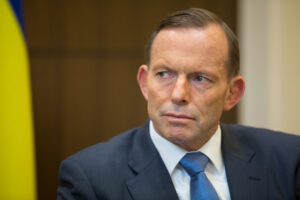In the summer of 2020, it was reported that the former Prime Minister of Australia, the controversial Tony Abbott, was set to become a UK trade Advisor.
The news came as a surprise to many, as Mr Abbott comes with an array of baggage and controversy. But just how did the former Rhodes Scholar gain such a reputation, and why are the UK government seemingly so keen to get his take on trade policy?
Tony Abbott was born in the UK to Australian parents in 1957, though his family returned down under not too long afterwards. His burgeoning interest in politics saw Mr Abbott attend the University of Sydney, where he would study Economics and Law. He subsequently would spend a year at Oxford University, after receiving a coveted Rhodes Scholarship.
Following his time in education, Mr Abbott briefly trained to become a Catholic priest, which was part of the reason he would later earn the nickname of “The Mad Monk”. A short spell as a journalist would be followed by his first real foray in the world of politics, as he became an advisor to the Liberal Party in the early 1990s – before being elected to represent the wealthy district of Warringah.
Steady progression through the ranks would eventually see him fulfil two cabinet positions; firstly as Employment Minister, and latterly as a minister for Health and Aging. 2009 was a pivotal year in Mr Abbott’s blossoming career, as he narrowly defeated incumbent Liberal leader Malcolm Turnbull in a party leadership content. This came despite his propensity for a gaffe or two – making it something of a political upset.
Do your own bit of Australian gambling via Casino Zone’s Australian listings.
Tony Abbott, in his time as a frontline politician, earned a reputation for opposing progressive policies at every turn. He famously voted against laws that would have legalised abortion, while also being against gay marriage when the issue was proposed in parliament. Similarly, controversial stances and statements on women even prompted former Labour Party leader Ms Julia Gillard to publicly scold him, in a speech that went viral online.
Despite a grilling from his opposite number, Abbott would defeat the Labour Party handsomely in the 2013 election, to ensure he become Australian Prime Minister. Mr Abbott caused a great deal of controversy barely a week into his new job, as he decided to appoint only one woman into his cabinet. The Sydney native would last just two years as a Prime Minister, but in that time, he certainly made his mark. One policy of his involved setting up a militarized Border Patrol in order to detain anyone who tried to enter the country illegally.
As Prime Minister, he promised to tighten borders, lower taxes and reduce the size of government, but arguably, his legacy is most tethered to that of climate policy. While Mr Abbott never formally denied climate change, he most certainly did try to downplay its effect. While in office, he derided climate change as “faddish”, before going onto describe how the world was in the grips of a “climate cult” at the end of 2019.
In 2015, the gaffes and controversy all seemingly got the better of him, with unpopular health and tuition fee policies proving to be the final nail in the coffin for Abbott’s premiership. He was subsequently defeated by former rival Malcolm Turnbull in another leadership contest, returning to the backbenches as he did so. In 2019, he lost his local seat of Warringah for good, and with Abbott now seemingly out of work, it’s not hard to see why the former PM is being approached by the UK government.
Mr Abbott has secured trade deals with numerous South-East Asian countries in the past, meaning he certainly has credibility in this particular arena. With that being said, his current advisory role to the UK looks set to be far more intricate, as it will involve negotiating one of the most complex trade deals in European history.
